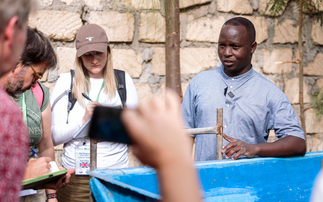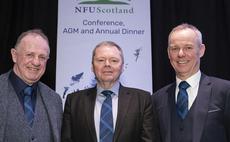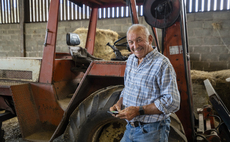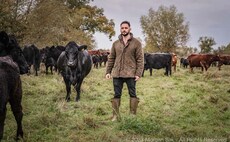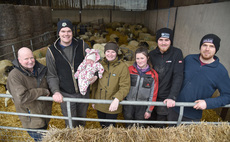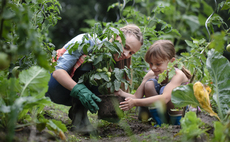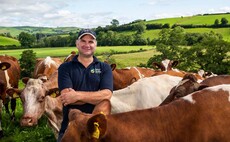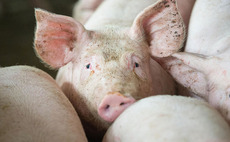
It all began with a simple but profound question: What if we could rebuild our relationship with food, farming and the land from the ground up?
That question runs through Six Inches of Soil, a documentary I was lucky to work on that has just been announced as a finalist in the BBC Food and Farming Awards. I thought I was signing on to support a film - I didn't expect it to reshape how I see farming, not just as food production, but as education, community and connection.
The film doesn't promote a single method or model. Instead, it tells the stories of people, farmers, families and young change makers, working together to ask how we can grow differently. At the root of it all is a belief that young people deserve more: more connection to nature, more understanding of food and more opportunity to shape the future they'll inherit.
And yet, when we look at our national curriculum and who now holds power over it, the glaring absence of food, farming and climate education speaks volumes.
Over 40% of children leave primary school overweight or obese; only 6% eat a healthy diet; one in six struggles with mental health.
These are not just health statistics; they are the reflection of an education system disconnected from children's lived realities.
And while the UK Government talks about climate leadership and public health, the school curriculum remains virtually silent on the very systems that underpin both.
The recent cabinet reshuffle has brought new faces into key departments, and with them, new chances and risks.
At the Department for Education, decisions are being made about the scope and ambition of the national curriculum review. Will food, farming and climate finally find a place?
At Defra, leadership changes could reshape how farming is supported, and whether it's seen as part of the climate and health solution.
Meanwhile, the Department of Health and Social Care is under renewed pressure to reduce obesity and mental health inequalities but still lacks joined-up action with education.
This reshuffle presents a rare window for alignment - or another missed opportunity.
Let's not forget the bold ambitions already on record
In the UK Net Zero Strategy in October 2021 it stated: "Our education system plays a vital role in equipping young people with the knowledge and skills to drive the transition to net zero."
In the National Food Strategy in 2021 it said that education is ‘essential to inspire healthier, sustainable diets and improve public understanding of food origins and environmental impacts.
Yet in practice, the Government's own curriculum review continues to sideline food, farming and nature education. Public health campaigns and school policies remain disconnected and inconsistent.
And the Obesity Strategy's promise to restrict advertising of unhealthy food to children is still riddled with loopholes, especially in online and brand marketing.
Meanwhile, no new Equality Impact Assessments (EqIAs) related to food education have been published since 2013, despite legal obligations under the Equality Act 2010.
This isn't just a missed policy link. It's a structural failure that worsens inequality, disproportionately harming the children most in need of change.
While policy stalls, hope is emerging in fields, classrooms, and community projects across the UK.
Six Inches of Soil shows what's possible when young people engage with the land, not just to learn about farming, but to understand the interwoven issues of health, climate, culture and care.
These lessons don't require a specific farming method. They require inclusion, representation, and access to real-world learning, from farm visits to growing projects, school meals to soil science.
Farming communities, whether conventional, regenerative or anywhere in between, have a powerful role to play as educators and collaborators.
The curriculum review, now quietly underway, is a once-in-a-generation opportunity. But as it stands, the process risks being under-resourced and overly cautious.
Professor Becky Francis, leading the independent Curriculum and Assessment Review, recently said:
"We're very much focused on evolution, not revolution…capacity on the ground at present is very limited."
But evolution without equity leaves the same children behind.
And without updated Equality Impact Assessments, it's difficult to know whether proposed reforms are helping to close or widen existing health and education gaps. This may not be an intentional oversight, but legal safeguards like EqIAs exist for this very reason: to ensure no policy change unintentionally leaves vulnerable children further behind.
This is not about blame. It's about leadership, accountability, and urgency.
Here's what must happen:
- Close advertising loopholes to protect children from harmful food marketing, especially online
- Embed food, farming, and climate education into the national curriculum across key stages
- Publish updated Equality Impact Assessments to ensure curriculum changes reduce, not reinforce, inequality
- Foster real cross-departmental collaboration, with education, health, and environment working as one
If the government's promises, from net zero to public health, are to be more than words, they must act now. Children deserve answers to questions that haven't yet been addressed.
On 13 October 2025, a cross-sector roundtable in Westminster will bring together educators, health experts, farmers, youth leaders, and policymakers to face this head-on.
This isn't about prescribing methods or passing blame.
It's about building common ground, in policy, in classrooms, and in the soil beneath our feet.
Because if we don't address this gap now, we're failing both our children and the future they will inherit.









